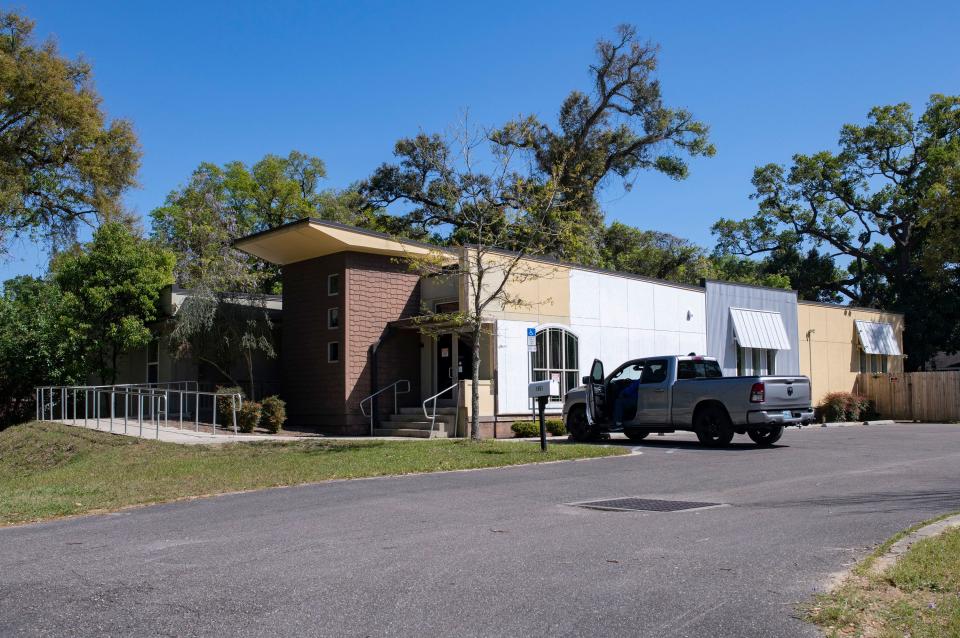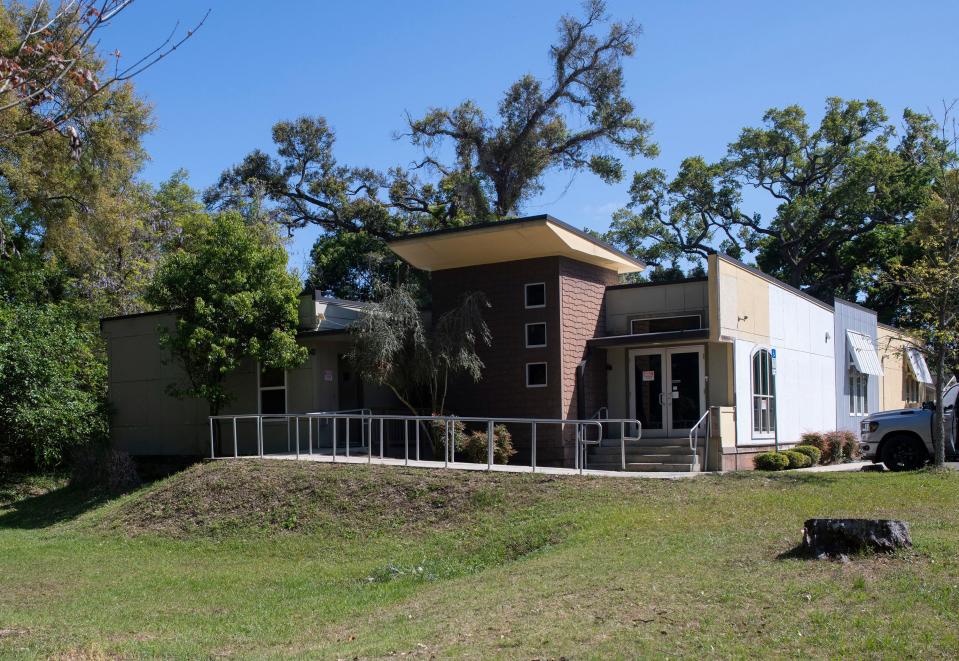Despite its financial flaws, Pensacola grants REAP $370K to create housing for the homeless
Pensacola approved a new $370,000 grant for Re-Entry Alliance of Pensacola Inc., marking the nonprofit's first approval of new funding since the city voted to conduct an audit and freeze city funding for the organization.
The $370,000 will go to allow REAP to buy the former Pathways for Change Clinton Cox Residence on West Blount Street and rehabilitate the building to provide a 12-unit, low-rent transitional housing option for homeless individuals.
The grant, which originated under Mayor Grover Robinson's administration, was delayed by the audit of REAP and drew concern from City Council President Delarian Wiggins and Councilman Charles Bare.
After a lengthy debate Thursday night, the City Council voted 5-2 with Wiggins and Bare in opposition to approving the grant project.
The West Blount Street property is the same property where REAP set up its Safe Outdoor Space Camp, which serves as an emergency intake shelter for its other homeless programs.

Previous city homeless spending: Pensacola allocated $2.2 million for homeless programs. How has that money been spent?
Audit ordered: Council wants oversight of living conditions at REAP homeless camp, pauses funding
Wiggins initially pushed for the audit last October after complaints about the conditions at the REAP camp — which had been hastily set up when the city forced a large encampment under Interstate 110 to be vacated earlier that year — and allegations by Melissa Johnson, the former director of the camp, that REAP was mismanaging city funds.
"Last year, when I walked that property, it was horrendous," Wiggins said Thursday. "From the heat, the food being out on tables, spoiled, the smell of the raw sewage, that's what initially sparked the audit. We just got briefed on this audit on Monday. We were told about the discrepancies on Monday, but today, we're wanting to push $370,000 to pay off a building for REAP when they haven't met the expectations."
The REAP Audit found Pensacola ARPA funds weren't misused
The forensic audit into REAP's spending of city funds granted through the American Rescue Plan Act was completed last month and found that REAP lacked proper internal processes and procedures to track how funding was being used.
The audit, which cost the city $25,000, found that out of the $591,000 covered in the audit, approximately $2,917 of REAP spending was ineligible for reimbursement by the city. A subsequent response to the audit by REAP with more information about the expenditures brought the number down to $511 that was ineligible for reimbursement.
Johnson's specific allegations that REAP was misusing city money were not substantiated, however, because REAP was using a single bank account for all of its operations so it likely appeared to her city funds were being spent on non-approved items, according to the audit.
The auditors called on REAP to separate program funds into different accounts to ensure transparency as part of 10 policy change recommendations to the organization.
Vinnie Whibbs, executive director of REAP, told the City Council the organization is in the process of adopting all of the policy change recommendations made by the auditors.
"They're all nearly accomplished now," Whibbs said.
Pensacola has about $1.2 million to spend on homelessness
REAP's funding is part of the city's $3 million in ARPA funding pledged to address homelessness.
As of Feb. 28, the city has spent a little more than $1 million of the $3 million between the six organizations that received funding, according to city records.
REAP was awarded $642,000 in funding for its SOS Camp, Max-Well Respite Center and Lodges women and children's shelter. Additionally, the city approved $180,000 for hotel voucher program and REAP used approximately $149,000 of that program, according to the audit.
Of the $642,000 allocated to REAP, approximately $604,596 has been paid out to the nonprofit, according to city records.
When including funds given up by the LOTUS campaign, the city has approximately $1.2 million of the $3 million in ARPA funding that needs to be allocated.
Those funds could be put to work soon in a new direction as Pensacola Mayor D.C. Reeves announced Thursday that he is working to arrange a joint meeting of the City Council and Escambia County Commission in May to hear from the U.S. Interagency Council on Homelessness Regional Advisor Joe Savage on the federal government's strategic plan to address homelessness.
Pathways for Change building
On Monday, Wiggins questioned the ownership of the Pathways for Change building.
Pathways for Change's executive director is Connie Bookman, mother of Mayor D.C. Reeves.
Reeves said during his weekly press conference he had had no involvement with the grant selection process noting that REAP was selected for the grant under Robinson's administration but was delayed because of the audit.

Reeves said Monday he had relied on city staff to decide how to move forward on the grant, and when the item came up at the council meeting, he would not weigh into the discussion.
"The reason I'm not going to speak to any specifics or any feelings about this is No. 1: I wasn't here when this when this process started," Reeves said. "And No. 2: I certainly understand that I don't want the optics (to be) that anything has changed or that I've been promoting anything whatsoever regarding this topic. I plan on introducing the item and bringing up our housing department in Thursday's meeting. I won't be speaking at all or sharing any opinion or anything that could be considered influence to this subject."
On Thursday, Reeves did just that.
The board of Pathways for Change voted to donate the building to REAP, according to city officials; however, Pathways for Change still owes about $325,000 on its mortgage, which Escambia County holds.
Pathways for Change used the building from 2017 to 2020 as housing for homeless female veterans but had to close down the program because of construction defects with the building, including a bad foundation and water damage causing wood in the building to rot.
In 2021, Pathways for Change sued the contractors who built the building, which included Escambia County Commissioner Lumon May's construction company. The lawsuit was settled out of court last year, but the defects with the building have not been fixed.
New REAP shelter:Pensacola has few shelters for homeless women and children. One is running out of funding.
Whibbs told the council that he believes the building can be repaired for less than $100,000, which will be funded by REAP. The grant will be used to hire an architect to assess the building and pay off the mortgage owed to Escambia County.
The grant agreement doesn't allow the mortgage to be paid off until REAP has secured all funding for the building repairs.
Both Bare and Councilwoman Jennifer Brahier expressed skepticism that the building could be fixed for less than $100,000 after reading the Pathways for Change lawsuit.
"I read the complaint about this particular building," Bare said. "I'm concerned there's more than meets the eye."
Whibbs said he's already selected an architect who will do an assessment of the building.
"We've been around the property for little more than a year, and so we're pretty familiar with it," Whibbs said. "And I can tell you that based on our inspections, there has been no interior water damage at all. There is damage underneath, and that's part of the estimates that will be done."
'Not perfect'
Under the grant, REAP would rent out the 12 units for $450 a month to individuals as they transition from homelessness to permanent housing if their income is between 30% and 50% of the area median income or $500 if is between 50% and 80% of area median income.
The grant required REAP to provide the service for at least five years, but Brahier amended the requirement to 10 years, which won the unanimous backing of the council.
After more than an hour of discussion, Wiggins said he still could not support awarding the grant to REAP when there is still a camp in the back of the building and REAP hasn't finished implementing the policy changes from the audit.
"They had some discrepancies; granted, they were talked about, but how do we know they're fixed?" Wiggins said. "We have to allow them to fix these discrepancies first before we go out and grant someone $370,000. Yes, REAP has done a great job. I applaud you for that. But this is in my district, and I cannot support it — at all."
Councilwoman Allison Patton came to the defense of REAP, saying she has seen the good work they're doing firsthand.
Patton said she was concerned about the conditions in the SOS Camp last year, but city code enforcement has done weekly checks on the camp since then and that the camp is needed until there is a low-barrier shelter.
"It's important. It's not perfect by any stretch," Patton said. "… But right now, at this very moment in time for just hopefully, short term, foreseeable future, (the camp) is a critical part of the infrastructure that we need in our community."
Bright Bridges Ministries seeks a cut of Pensacola grant funding
The $370,000 grant awarded Thursday is being funded with federal dollars through the U.S. Department of Housing and Urban Development. The city advertised the grant in August with a September deadline.
During the council's agenda conference Monday, Wiggins said he's heard from other nonprofits who did not know about the opportunity for a new city grant.
Pensacola Housing Director Housing Director Marcie Whitaker said nearly 100 organizations were sent the opportunity to apply in August, and city staff contacted several nonprofits directly.
Bright Bridges Ministries Executive Director Robin Noble appealed to the City Council on Thursday to reconsider her organization for the grant.
Bright Bridges Ministries received $281,400 in city ARPA funds to fund case workers for its men's shelter. As of Feb. 28., Bright Bridges had used $43,750 of its ARPA funds.
Bright Bridges and REAP both applied for the grant, but Bright Bridges withdrew because they believed the grant required the rooms be available for single occupancy.
Noble said that Bright Bridges won another grant from the Florida Department of Economic opportunity to double its shelter space from 41 beds to 82 beds and they now believe they can meet the requirements of the city grant.
"We would like to resubmit, and we can do that as early as Monday," Noble said.
While many council members said they supported the work of Bright Bridges, only Wiggins and Bare support re-soliciting the grant.
This article originally appeared on Pensacola News Journal: Pensacola homeless organization REAP creating affordable housing units

